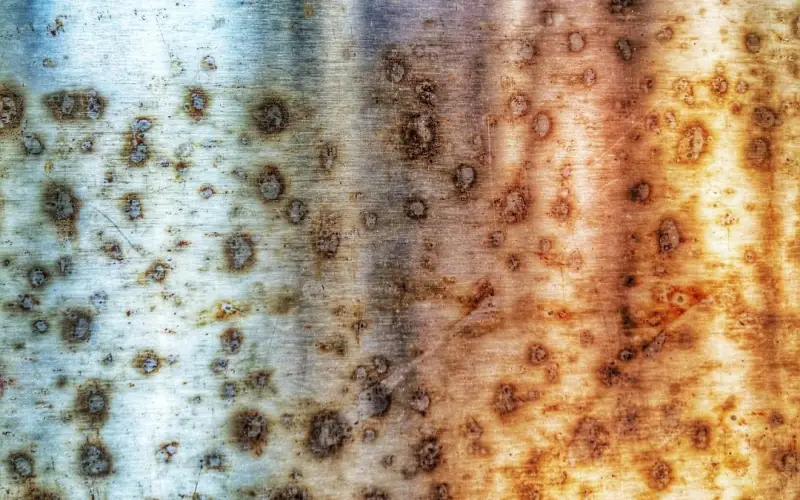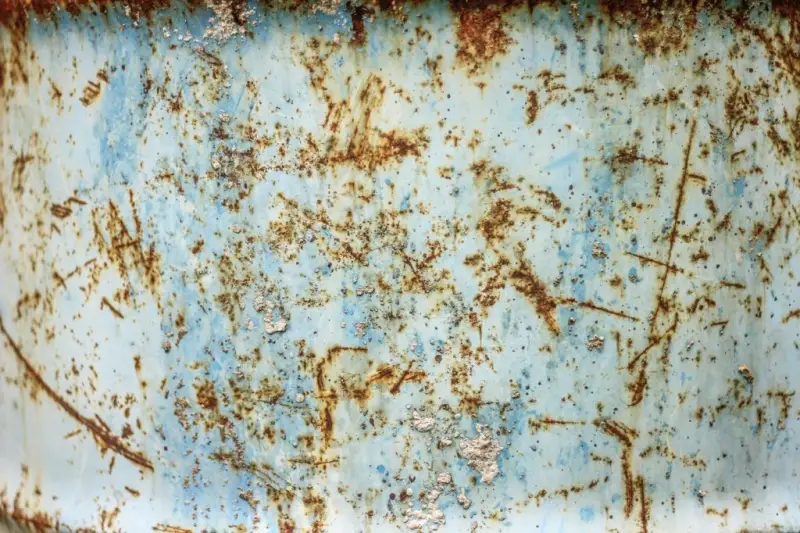Aluminum is a popular metal that is widely used in many different applications due to its durability and corrosion resistance. Unlike iron and steel, aluminum is not prone to rusting, which makes it an ideal choice for outdoor applications where weather conditions can cause other metals to deteriorate. However, just because aluminum doesn’t rust doesn’t mean that it’s completely immune to corrosion.
While aluminum doesn’t have the same tendency to corrode as iron and steel, it can still be affected by other forms of corrosion. One common type of corrosion that aluminum can suffer from is called white rust. This occurs when the surface of the aluminum is exposed to moisture for an extended period of time. The moisture reacts with the aluminum and forms a white, powdery substance on the surface that can weaken the metal over time.
Another type of corrosion that aluminum can be susceptible to is called galvanic corrosion. This occurs when aluminum is in contact with other metals that have a different electrical potential. The difference in electrical potential between the two metals can cause a reaction that results in corrosion. To prevent galvanic corrosion, it’s important to use proper fasteners and avoid exposing aluminum to other metals that are not compatible.
Does Aluminum Rust
Rust is a form of corrosion that occurs when iron reacts with water and oxygen. The result is a red-brown flaky substance that can weaken the metal and make it look unsightly. With aluminum, though, you don’t have to worry about that! Aluminum is a non-ferrous metal, which means it doesn’t contain iron. That means there’s no iron to react with water and oxygen and form rust.
Now, that’s not to say that aluminum is completely immune to corrosion. It can still be affected by other forms of corrosion, like white rust or galvanic corrosion. But, compared to iron and steel, aluminum is much more resistant to corrosion, and it’s also much lighter, making it a popular choice for many applications.
One of the things I love about aluminum is that it’s so versatile! It’s used in everything from cars and airplanes to packaging and construction. It’s also widely used in the manufacture of consumer goods like electronics, appliances, and sporting goods. And the best part is, aluminum products stay looking good and performing well for years, even in harsh environments!
Сomparison table between Aluminum and Iron/Steel
The ingredients that contribute to rust formation in iron and steel are iron, water, and oxygen. In the presence of these three elements, iron reacts with water and oxygen to form iron oxide, which is commonly known as rust. This reaction weakens the metal and can cause it to become unsightly over time.
Aluminum, on the other hand, is a non-ferrous metal that does not contain iron. This means that it is not prone to rusting, as there is no iron present to react with water and oxygen. While aluminum can still be affected by other forms of corrosion, such as white rust or galvanic corrosion, it is much more resistant to corrosion than iron and steel.
| Property | Aluminum | Iron/Steel |
|---|---|---|
| Composition | Non-ferrous metal (no iron) | Ferrous metal (contains iron) |
| Tendency to rust | Does not rust | Prone to rusting |
| Corrosion resistance | Resistant to corrosion | Susceptible to corrosion |
| Weight | Lightweight | Heavy |
| Appearance | Maintains appearance over time | Can become unsightly due to rust formation |
In conclusion, the difference between aluminum and iron/steel in terms of rust formation lies in their composition. Aluminum, being a non-ferrous metal, does not contain iron and is therefore not prone to rusting. On the other hand, iron and steel are ferrous metals that contain iron and are susceptible to rust formation in the presence of water and oxygen.

Table of equipment that can be used when working with aluminum to prevent or mitigate corrosion
| Equipment | Purpose |
|---|---|
| Cleaning tools | To remove any dirt or debris from the surface of the aluminum before and after processing or fabrication |
| Protective coatings | To provide an additional layer of protection against moisture and other corrosive elements |
| Anodizing equipment | To electrochemically treat the surface of the aluminum to improve its resistance to corrosion and enhance its appearance |
| Compatible fasteners | To prevent galvanic corrosion, which can occur when aluminum is in contact with other metals with a different electrical potential |
| Climate-controlled storage | To protect aluminum components from exposure to moisture and other corrosive elements when not in use |
It’s important to properly maintain and protect aluminum components to ensure they maintain their durability and strength over time. By using the right equipment and following proper storage and handling practices, you can ensure that your aluminum products remain rust-free and in good condition for many years to come.

FAQ
Does aluminum rust?
No, aluminum is a non-ferrous metal and does not contain iron, which is the primary ingredient required for rust formation. Aluminum is still susceptible to other forms of corrosion, such as white rust or galvanic corrosion, but it is much more resistant to corrosion than iron and steel.
Can aluminum corrode?
Yes, aluminum can corrode in certain conditions, such as in the presence of moisture or in the presence of other metals with a different electrical potential. However, aluminum is much more resistant to corrosion than iron and steel, and proper storage and maintenance can help to prevent or mitigate corrosion.
How can I prevent aluminum from corroding?
To prevent or reduce the likelihood of aluminum corrosion, you can:
Clean the surface of the aluminum regularly to remove any dirt or debris
Apply protective coatings to the aluminum surface
Use compatible fasteners to prevent galvanic corrosion
Store aluminum components in a climate-controlled environment
Store aluminum components in a climate-controlled environment
What is the difference between aluminum rust and iron rust?
Rust is a form of corrosion that occurs in ferrous metals, such as iron and steel, when they react with water and oxygen. Aluminum is a non-ferrous metal and does not contain iron, so it does not rust. However, aluminum can still be affected by other forms of corrosion, such as white rust or galvanic corrosion.
Can aluminum rust be painted over?
No, aluminum does not rust, so there is no need to paint over it. However, you can paint aluminum to enhance its appearance or to provide an additional layer of protection against corrosion.



Leave a Reply